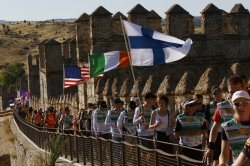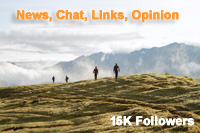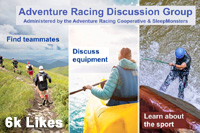National Teams @ ARWC - Pandoras Box or Holy Grail?
Rob Howard / 14.11.2013

Nathan Fa’avae’s open letter to the AR World Series appealing for a national teams policy at the AR World Champs has triggered a major change in the top tier of adventure racing. For the 2014 AR Worlds’ teams must have 3 of the same nationality, and from then on teams must all be from the same nation. (See the details here.)
This could have far reaching consequences for teams, expedition race organisers and the sport of adventure racing.
Since the announcement most of the published social media comments have been negative, some of it a backlash from those disadvantaged by the rule change, i.e. the established mix nationality teams. It’s not wise to read too much into social media comments however and there are many supporters, not least the AR World Series races who have made the change.
AR World Series Race Director Craig Bycroft made this comment when announcing the news. “We had extensive discussions within the AR community and the overwhelming majority of athletes were in support of the change. So in that regard, and with an implementation over 2 years, I am confident it is the best direction for the AR World Championship and will be received positively.”
It’s a divisive issue for sure, and I’ve pulled together some of the arguments from published comments and those sent to us here at SleepMonsters.
Do it for Your Country
Perhaps Fa’avae’s most compelling argument, as a multiple world champion himself, was that he felt the AR World Champs (ARWC) was just another race, and meant no more to him than any other because it was not “an authentic World Championship event”. That was the damning conclusion to his letter.
He argued it means more to race for your nation and would be beneficial because;
- International sport was organised along national team lines and AR was out of step
- National teams would make it easier for the media to follow the sport
- Having national teams would attract more support and funding within countries
- As a result of having to look within their own country teams would find new talent
The Pros and Cons
- Fa’avae cited Mountain Biking and Cycling as models where the World Champs was for National teams only, despite much of the competition the rest of the year being between commercially sponsored international teams. He also recalled how Mark Burnett had changed Eco-Challenge to national teams after asking the International Olympic Committee how to get Adventure Racing into the Olympics.
Certainly high profile team sport like the Olympics and various world cups (soccer, rugby etc.) are national competitions and these do generate national support.
Team Thule Adventure and others have pointed out that the UCI recently went the other way and made the World Road Cycling Champs a corporate teams event. We’ve also recently had an Americas Cup between ‘Oracle Team USA’ and ‘Emirates Team New Zealand’.
That event certainly did not lack for funding, media coverage or national support, but both were mixed nationality teams and there was no lack of home support for the USA team, despite there being only 3 Americans on the team of 12. (One of those was the Tactician who was replaced half way through by the UK’s Sir Ben Ainslie – after which Team USA started winning! – Ed. As a Brit I couldn’t resist putting that in!)
So, there are alternative organisational models that do work and all the recent ARWC events have been fully subscribed, having twice as many teams as any other international expedition events. The counter argument is; ‘If it ain’t broke, it does not need fixing.’
- As a journalist covering AR (probably more than any other) I can certainly take on board the point that it is a confusing and difficult sport to explain to an audience, especially a mass media audience with little awareness of what AR is.
The constantly changing team personnel and team names make it even harder to explain what is going on and national teams would be more consistent and easier to follow. Having national teams should also make it easier to get the attention of the wider mass media.
Team make up is far from the only problem AR has in attracting media coverage – the wider lack of knowledge of the sport, inaccessibility to journalists and high costs, especially for TV coverage, are all part of the mix. Having National teams won’t be a magic bullet here.
It’s also easy enough for teams to present themselves as ‘national teams’, even if they have one or two racers from out of their country – plenty of teams carry a national flag that does not quite cover all the team members and carry it off.
- Will having national teams at the World Champs be the catalyst to get more government or sports organisations to back AR with funding (and recognition)?
Fa’avae believes so and points out that the only time the N.Z. government have supported a team was then they raced as Team NZ at Eco Challenge (at the race held in New Zealand).
Over the years I have seen many reports and attended many meetings about various proposed national and international associations of Adventure Racing and I can sum them up together fairly quickly – they’ve gone nowhere!
Given that is the case maybe something does need to change radically to take the sport forward and having national teams at the very highest level could be the change that is needed.
All the above assumes those involved in the sport want official recognition - to be followed by funding. There are many racers who would rather be free to race with who they want and enjoy the fact all the races do things in their own unique way – they like the free spirit of adventure racing. Organisers too are usually ‘strong individuals’ who like to do things their own way, and may not want to be constrained by national rules, sit on committees or deal with sports politics. Freedom could be the price to pay for recognition and funding.
Team Tecnu (who have 3 U.S. and one Canadian racer in the team), have argued as follows; “It would be nice to be able to race with teammates who you really like racing with, who are your good friends, who have like experiences and you’ve raced together with a lot and know their strengths and weaknesses – and that is sometimes hard to find in the same country.”
Others have made the point that racers who live outside their home nation will be disadvantaged, as will those racers who live in countries where AR is not established at all. To get top class competition they rely on joining teams in other countries as there is no prospect of raising a competitive team in their own country.
One world class team has also told me there isn’t a female racer of a high enough standard in their own country to race with, and that they don’t want to go to a World Champs just to make up the numbers.
Many comments have been made that the rule change will favour some countries more than others, and New Zealand and Sweden will just dominate even more. In many ways Fa’avae coming from New Zealand made his case weaker – his country has a national organisation, established youth and schools AR events and a high degree of recognition for the sport at all levels ... but that isn’t the case anywhere else.
Team Thule Adventure have commented; “When there are many different national associations of multisport/adventure racing, that day maybe we’ll be ready to see just national teams in the Adventure Racing World Championship! But our sport is not there yet, and we are far from it!”
Even if national associations do establish themselves there no guarantee of any funding. France has a very large national ‘association’ which is recognised and supported to a degree at government level, but there is no financial support for French teams at international level, not yet anyway.
If funding does come it may take many years, and in the meantime teams will need commercial sponsors to support them. Being a national team may help get these, but I would have preferred to see the sponsor’s name first, followed by the nation (as in the Americas cup).
That isn’t the case under the new rule, but I think the sponsors will not want to see their team referred to in short as ‘Team NZ’ or ‘Team USA’ and their names left off ... and that is likely to happen.
There are clearly real challenges to some teams and racers in this rule change, and the question is whether the short term pain of adapting will lead to longer term gain for the sport.
- “I know from history that when people are forced to look within their country to find great team mates they will.” So said Nathan Fa’avae in his letter.
There is no doubt AR needs a broader competition base and more talent coming through, and teams having to look within their own national pool of racers will surely have a greater interest in bringing through and finding new talent.
Some racers who used to be involved at the top level of AR, but are no longer, have also told me they might return to the sport to compete in a national team if that option was available.
On the other hand that is easy for a kiwi to say! ... Especially one already established in a single national team and with a lot of other talent to call on at home.
Once again, it will take a long time for other nations to develop new talent to a level that can compete at the AR World Championships, that takes many, many years of experience – so again there will be short term challenges, for potential longer term gains.
Going Forward
Given all the above it was a difficult and a brave decision to make and puts the A.R. World Champs at a crossroads.
Whether it is beneficial to the World Series, the sport as a whole, or affects grass roots racing remains to be seen. (And it will be very interesting to see who steps forward to host the first fully national World Champs in 2015.)
How everyone involved in expedition racing deals with the change will be critical.
If top teams drop out of competition or promote other events as alternative ‘professional world championships’ (as has already been suggested), then a Pandora’s Box may have been opened and we could have years of division and argument ahead.
If they get behind the change and deal positively and pro-actively with the challenges it presents then maybe the Holy Grail of a more organised, better funded and more widely recognised sport is achievable.






 SleepMonsters
SleepMonsters



